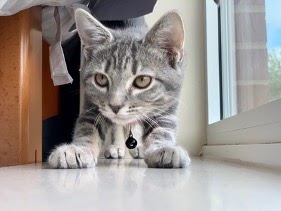
By Laurynn Davey, Assistant Editor
Photos by Callie Hoadley
During the tough times of COVID-19, a worldwide pandemic affecting many individuals, I have found myself both lonely and deeply affected by my mental health. Not being able to see my friends and hang out with them (as I normally would have a year ago) has brought me down both physically and mentally, and I’m sure the same can be said for other students. So I thought to myself, how can I escape this loneliness? For me, the answer was obvious. I need my cat.
For many young adults, college tends to be a difficult time. Meeting the expectations of professors and coaches, keeping up their grade point average, and just attending classes in general takes a toll on students. For students who live out of state, it’s particularly hard to be away from family and friends. It’s also hard to be away from lovable companions, such as their pets. This pandemic has only made these times even more difficult for those continuing to live on campus.
According to the ‘Fair Housing Act’ and the ‘Rehabilitation Act,’ emotional support animals must be allowed into college dorms. Animals can range from cats, dogs, lizards, hamsters, bunnies, and so on. However, there is a legal case a student would have to go through before they can bring in their emotional support animal.
A student must first be approved by a doctor or mental health professional for a letter that states their right to an emotional support animal. For McKendree students, that letter needs to be taken to Jennifer Miller, the assistant dean for student success, on campus.
“Jenni Miller will give you all the forms you need,” said Tia Kay, a current McKendree graduate who once owned a cat on campus. “You have to clearly state why you want the animal, what benefits it’s going to give to you, and your mental stability and why you need the animal.”
She explained to me that an animal has to be owned by a student for at least six months before it can be registered with the school. Tia had to provide documents that gave the cat’s age and proved how long she (or her family) has owned it, as well as if the animal is updated on all its shots.
“All that goes to Jen, and she approves it,” Kay said.
Once approved, all roommates living with the student must consent to have an animal live with them by signing a paper stating their agreement.
When asked how she feels her cat–named Shelby–helps with her mental health, Tia explained how it’s important to be around people who don’t know about the situation. “Like, I can just come home to someone who doesn’t have the troubles I do and take that as ‘oh, she’s so positive!’” She also felt Shelby was a great addition to her dorm room family. Her three roommates loved having the cat around.
“She benefited everyone in the room, not just me,” Kay said, suggesting that emotional support animals not only support the owner but also help the people around them.
Emotional support animals are not required to go under any specialized training. They provide comfort and support in the form of affection.
“Through the hard times, she loved to cuddle with everyone,” Tia expressed.
The presence of emotional support animals comfort students who suffer from a variety of mental health issues, including depression, anxiety, agoraphobia, PTSD, and more. According to ESA doctors, should a student choose to bring their pet to campus, noticeable improvements include an increase in being social, higher motivation, higher self-esteem, and an increase in the student’s self of purpose.
McKendree University is in full support of emotional support animals, and it’s fairly easy to request. Once an online form is submitted, Jenni Miller goes through your request then provides the documents needed to complete the process of approving your animal before moving them into your dorm. I cannot wait for my cat to share his “McKendree experience” with me during these tough times!


If you think and Emotional Support Animal may be right for you, don’t forgot to read over the Assistance Animal policy in the Student Handbook starting on page 60. (https://www.mckendree.edu/policies/student_handbook.pdf) Many of these policies are not just aimed at protecting residents and property but requiring a proper standard of care for the emotional support animal as well. Ready to move forward, speak with your prescribing doctor and check out the Disability Services webpage (https://www.mckendree.edu/offices/student-success-advising-center/disability-services.php) for “How do I register with the Success Center for housing accommodations-Emotional Support Animal?”
[…] Campus Cats – While it’s super beneficial to have your animal with you during the college experience, especially in the middle of a lonely pandemic, there is a process to complete with your school. I sat down with Tia Kay, a McKendree graduate, to understand what this process entails. […]
[…] Campus Cats – While it’s super beneficial to have your animal with you during the college experience, especially in the middle of a lonely pandemic, there is a process to complete with your school. I sat down with Tia Kay, a McKendree graduate, to understand what this process entails. […]